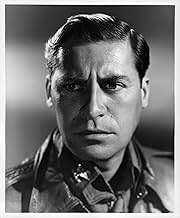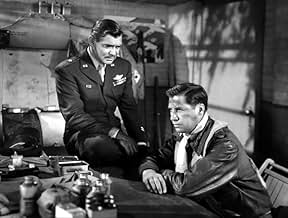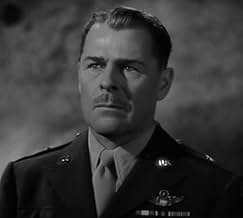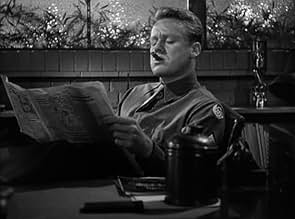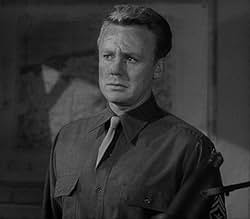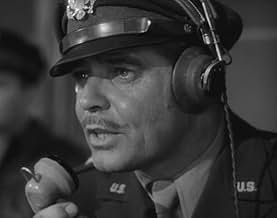IMDb RATING
7.3/10
2.2K
YOUR RATING
Army generals struggle with the decision to prioritize bombing the German factories producing new jet fighters over the extremely high casualties the mission will cost.Army generals struggle with the decision to prioritize bombing the German factories producing new jet fighters over the extremely high casualties the mission will cost.Army generals struggle with the decision to prioritize bombing the German factories producing new jet fighters over the extremely high casualties the mission will cost.
- Director
- Writers
- Stars
- Awards
- 3 wins & 2 nominations total
- Director
- Writers
- All cast & crew
- Production, box office & more at IMDbPro
Featured reviews
"Command Decision" is a wonderful film filled with several great performances. It's Gable's movie, but he's very capably supported by Walter Pigeon, Brian Donlevy and John Hodiak, who nearly equals his "Lifeboat" performance.
Pigeon is especially good in the roll of a senior commander who is more concerned with the political considerations of the war effort than the tactical and strategic goals. (Not without reason - The film correctly details the perilous and tenuous position that the 8th Air Force found itself in during the worst combat period of 1943.)
One of the best scenes in the film is a very long speech given by Pigeon, wherein he explains his reasons for fighting the good fight to keep American air power strong. The scene is a good 6 or 7 minutes long, one camera shot, entirely done without cuts. It must have been rehearsed extensively as it requires about 10 actors to interact with Pigeon at several times, all the while he is moving about the room. Seamless, and very well done! This remarkable scene is followed up with one almost as long, given by Gable.
The drama is occasionally broken up with comic moments provided by Van Johnson, as a savvy sergeant, and Clinton Sunberg as a fastidious aide to Pigeon's General Kane.
If you like to watch actors banging away with words instead of guns, this is the war movie for you.
Pigeon is especially good in the roll of a senior commander who is more concerned with the political considerations of the war effort than the tactical and strategic goals. (Not without reason - The film correctly details the perilous and tenuous position that the 8th Air Force found itself in during the worst combat period of 1943.)
One of the best scenes in the film is a very long speech given by Pigeon, wherein he explains his reasons for fighting the good fight to keep American air power strong. The scene is a good 6 or 7 minutes long, one camera shot, entirely done without cuts. It must have been rehearsed extensively as it requires about 10 actors to interact with Pigeon at several times, all the while he is moving about the room. Seamless, and very well done! This remarkable scene is followed up with one almost as long, given by Gable.
The drama is occasionally broken up with comic moments provided by Van Johnson, as a savvy sergeant, and Clinton Sunberg as a fastidious aide to Pigeon's General Kane.
If you like to watch actors banging away with words instead of guns, this is the war movie for you.
"Command Decision" is based on a stage play, so scenes of aerial combat are not to be found in the movie. This is a major difference between it and "Twelve O'clock High," released a year later in 1949, and which presented a more engaging, gritty, realistic motion picture of aerial combat and the toll it takes on the airmen and their support teams and commanders on the ground.
"Command Decision" tells a story of WWII air warfare from the point of view generals, politicians and the press, and the process of making a military decision in light of political consequences and public opinion. Clark Gable gives a great performance as General Casey, the officer who acts out of military necessity in choosing his targets, and in doing so, knows he puts the lives of his men and his friends on the line. Walter Pidgeon is General Kane, Gable's superior, who has lost some of his ability to look at his duty in purely military terms. Instead he perceives his mission is to fight the politicos and the press and to get the best spin on the actions of his command and commanders. Brian Donleavy is General Garnet, a relative newcomer to all of this. He is eager for his first command, but once on the scene at a combat headquarters, he begins to have doubts of his own about the mission, the politics and his own ability to send young men to their deaths.
The command decision in this fine, taut film is not one climatic decision, but is the story of a number of command decisions made by the three general officers, and how each effects and feeds off of the other men's command decisions throughout the film.
Good performances by all, a little melodramatic at times, but overall, one of the best war movies (especially about air warfare) you'll come across.
"Command Decision" tells a story of WWII air warfare from the point of view generals, politicians and the press, and the process of making a military decision in light of political consequences and public opinion. Clark Gable gives a great performance as General Casey, the officer who acts out of military necessity in choosing his targets, and in doing so, knows he puts the lives of his men and his friends on the line. Walter Pidgeon is General Kane, Gable's superior, who has lost some of his ability to look at his duty in purely military terms. Instead he perceives his mission is to fight the politicos and the press and to get the best spin on the actions of his command and commanders. Brian Donleavy is General Garnet, a relative newcomer to all of this. He is eager for his first command, but once on the scene at a combat headquarters, he begins to have doubts of his own about the mission, the politics and his own ability to send young men to their deaths.
The command decision in this fine, taut film is not one climatic decision, but is the story of a number of command decisions made by the three general officers, and how each effects and feeds off of the other men's command decisions throughout the film.
Good performances by all, a little melodramatic at times, but overall, one of the best war movies (especially about air warfare) you'll come across.
(There May Be Spoilers) Launching "Operation Stich" a week ahead of time, due to the favorable weather conditions over Germany, Brig. Gen. K.C Dennis', Clark Gable, B-17 Bombers suffer the loss of 48 aircraft on the first day's mission.
Going some 600 miles into Germany, without fighter escort, in a triangular bombardment of the key German industrial cities of Posenleben Schweinhafen and Fendelhorst. Gen. Dennis is determined to take them out Before the weather worsens and doesn't care how many planes and crews it costs him to do it.
The next days bombing of Schweinhafen cost another 24 B-17's. Due to German ingenuity in camouflaging the factories there the USAAF bombed the wrong city making it necessary to go on a bomb run the next day on the real Schweinhafen. By now the USAAF crews are at the point of refusing to go on their missions over Germany feeling that Gen.Dennis is out of his mind by sending then to certain death.
Gen. Dennis' superior and friend Maj. Gen. Kane, Walter Pigeon, is very upset with his actions and is about to relive him of his duties as combat-wing commander. Since Gen. Dennis launched his assault on Germany he lost some 70 bombers in two days compared to the loss of under 20 bombers lost by the RAF during the same period.
In a private meeting with Gen. Kane and other USAAF top personnel Gen. Dennis makes his case for the actions that he's taken even if it coast him his command of the B-17 combat-wing. The Germans are developing this revolutionary jet-fighter, the Lantze-Wolf. The Nazi Super-Plane is so superior to anything that the allies have that if it's manufactured in mass and put in the air the German Luftwaffe would drive the USAAF and RAF from the skies of Europe. It would make it impossible for a cross channel invasion of Europe the next year, 1944, and cost the allies the war.
Unable to open a second front in Western Europe and with the Luftwaffe having total air supremacy will force the allies, the USA UK and USSR, to agree to an armistice and peace treaty with the Germans on Hitler's terms. The bombing of those cities deep in Germany by Gen. Dennis' bombers will destroy the Germans ability to mass-produce the Lantez-Wolf. Thus save in the future countless American and Allied soldiers lives at the cost of the heavy, but necessary, losses in B-17 and their crews now.
This causes Gen. Kane to look the other way, knowing how right Gen. Dennis is, by allowing him to send his bombers out the next day and finally knock out the German industrial city of Schweinhafen. The bombing raid cost the life of Gen. Dennis best friend Col. Martin,John Hodiak. It's also in Schweinhafen where the jet-fighter is being assembled and in the end because of the heavy losses in that bombing raid Gen. Kane is forced, reluctantly, to relive Gen. Dennis of his command. US politicians like Congressman Arthur Malcolm, Edward Arnold, afraid of how the people back home feel about the staggering losses in the skies over Germany and Gen. Dennis' actions being responsible for them it's only a matter of time for him to be dismissed as a USAAF combat-wing commander.
The general took his dismissal with the same courage as his men took the murderous anti-aircraft fire and attacks of German fighters on the missions that he sent them on. Being replaced by his friend and fellow classmate at West Point Let. Gen. Clifton Garnet,Brian Donlevy.
Gen. Garnet also goes against the top brass, the next day, in ordering the bombing of Fendelhorst in central Germany to take out the last place where the deadly Lantze-Wolf are being made. With that, facing the same fate that Gen. Dennis just went through, ended up winning the war for the allies at the possible cost of his military career.
The truth is that like in the movie "Command Dicision" the Germans did develop a jet-fighter late in the war that if it was mass-produced and sent up against the allied air forces a year earlier would have won the Second World War for Germany. The German Masserschmitt Me-262 jet fighter could reach speeds of 540 to 580 MPH that was some 100 to 150 MPH faster then the swiftest USAAF and RAF fighters. In combat it scored as much as 700 combat kills over allied planes during 1944-1945. In their last major air to air engagement over Berlin in March 1945 some dozen Me-262's downed 25 B-17 and 5 fighter escorts to the loss of only two of their own.
Under 300 of the Me-262 jets put into combat and with, for the most part, them being flown by unexperienced pilots and with a shortage of jet fuel to keep the planes airborne for any long period of time. It turned out that the decision of USAAF generals like K.C Dennis to bomb the factories where the Me-262 were being made, despite the heavy allied air losses, that in the end won the war for the Allies in Europe.
Going some 600 miles into Germany, without fighter escort, in a triangular bombardment of the key German industrial cities of Posenleben Schweinhafen and Fendelhorst. Gen. Dennis is determined to take them out Before the weather worsens and doesn't care how many planes and crews it costs him to do it.
The next days bombing of Schweinhafen cost another 24 B-17's. Due to German ingenuity in camouflaging the factories there the USAAF bombed the wrong city making it necessary to go on a bomb run the next day on the real Schweinhafen. By now the USAAF crews are at the point of refusing to go on their missions over Germany feeling that Gen.Dennis is out of his mind by sending then to certain death.
Gen. Dennis' superior and friend Maj. Gen. Kane, Walter Pigeon, is very upset with his actions and is about to relive him of his duties as combat-wing commander. Since Gen. Dennis launched his assault on Germany he lost some 70 bombers in two days compared to the loss of under 20 bombers lost by the RAF during the same period.
In a private meeting with Gen. Kane and other USAAF top personnel Gen. Dennis makes his case for the actions that he's taken even if it coast him his command of the B-17 combat-wing. The Germans are developing this revolutionary jet-fighter, the Lantze-Wolf. The Nazi Super-Plane is so superior to anything that the allies have that if it's manufactured in mass and put in the air the German Luftwaffe would drive the USAAF and RAF from the skies of Europe. It would make it impossible for a cross channel invasion of Europe the next year, 1944, and cost the allies the war.
Unable to open a second front in Western Europe and with the Luftwaffe having total air supremacy will force the allies, the USA UK and USSR, to agree to an armistice and peace treaty with the Germans on Hitler's terms. The bombing of those cities deep in Germany by Gen. Dennis' bombers will destroy the Germans ability to mass-produce the Lantez-Wolf. Thus save in the future countless American and Allied soldiers lives at the cost of the heavy, but necessary, losses in B-17 and their crews now.
This causes Gen. Kane to look the other way, knowing how right Gen. Dennis is, by allowing him to send his bombers out the next day and finally knock out the German industrial city of Schweinhafen. The bombing raid cost the life of Gen. Dennis best friend Col. Martin,John Hodiak. It's also in Schweinhafen where the jet-fighter is being assembled and in the end because of the heavy losses in that bombing raid Gen. Kane is forced, reluctantly, to relive Gen. Dennis of his command. US politicians like Congressman Arthur Malcolm, Edward Arnold, afraid of how the people back home feel about the staggering losses in the skies over Germany and Gen. Dennis' actions being responsible for them it's only a matter of time for him to be dismissed as a USAAF combat-wing commander.
The general took his dismissal with the same courage as his men took the murderous anti-aircraft fire and attacks of German fighters on the missions that he sent them on. Being replaced by his friend and fellow classmate at West Point Let. Gen. Clifton Garnet,Brian Donlevy.
Gen. Garnet also goes against the top brass, the next day, in ordering the bombing of Fendelhorst in central Germany to take out the last place where the deadly Lantze-Wolf are being made. With that, facing the same fate that Gen. Dennis just went through, ended up winning the war for the allies at the possible cost of his military career.
The truth is that like in the movie "Command Dicision" the Germans did develop a jet-fighter late in the war that if it was mass-produced and sent up against the allied air forces a year earlier would have won the Second World War for Germany. The German Masserschmitt Me-262 jet fighter could reach speeds of 540 to 580 MPH that was some 100 to 150 MPH faster then the swiftest USAAF and RAF fighters. In combat it scored as much as 700 combat kills over allied planes during 1944-1945. In their last major air to air engagement over Berlin in March 1945 some dozen Me-262's downed 25 B-17 and 5 fighter escorts to the loss of only two of their own.
Under 300 of the Me-262 jets put into combat and with, for the most part, them being flown by unexperienced pilots and with a shortage of jet fuel to keep the planes airborne for any long period of time. It turned out that the decision of USAAF generals like K.C Dennis to bomb the factories where the Me-262 were being made, despite the heavy allied air losses, that in the end won the war for the Allies in Europe.
I found an old tape of Command Decision which I must have made 20 years ago. I concur with all those who have said that it is one of the best WW2 films ever made, but what struck me most forcefully was the fact that this highly intelligent, gripping and thoughtful film was made with a large crew of established filmstars by a completely commercial film studio. It brought home to me forcibly what was lost when the old studio system broke up and the sheer craftsmanship which it embodied was dispersed. The sheer childishness of most current films becomes even more evident.
Writing as one who lived through the bombing of Britain, the historical perspective on the Allied wartime bombing campaign was fascinating. One small complaint--all film coverage of the American campaign in WW2 seems to focus on the Flying Fortress. Actually, most of the bombs were dropped by the Consolidated Liberator squadrons--less photogenic but more effective!
Writing as one who lived through the bombing of Britain, the historical perspective on the Allied wartime bombing campaign was fascinating. One small complaint--all film coverage of the American campaign in WW2 seems to focus on the Flying Fortress. Actually, most of the bombs were dropped by the Consolidated Liberator squadrons--less photogenic but more effective!
This is one of the best WW2 movies. The acting and writing are superb and rather subdued at that. With Clark Gable you expect BIG ACTING AND BIG ACTION but in this one he does a very credible job portraying a very troubled man who is put in charge of the bombing campaign against the Germans. So, this movie is a bit of a stretch for the usually glib Gable, as it focuses on the emotional toll of war.
The movie is VERY similar to the great 12 O'Clock High (starring Gregory Peck). 12 O'Clock is a slightly better movie (and it gives Peck more room to hash out his character as the man in charge of sending airmen to their deaths), though they are so good I recommend seeing both.
The movie is VERY similar to the great 12 O'Clock High (starring Gregory Peck). 12 O'Clock is a slightly better movie (and it gives Peck more room to hash out his character as the man in charge of sending airmen to their deaths), though they are so good I recommend seeing both.
Did you know
- TriviaClark Gable enlisted in the US Army Air Forces after his wife Carole Lombard died in a plane crash on a war bonds selling trip assisting the war effort. Gable went to Officers Candidate School (OCS), graduating as a second lieutenant, and was eventually promoted to major. He was trained as an aerial gunner and combat cameraman and was awarded both the Distinguished Flying Cross and Air Medal for at least five aerial bombing missions over Germany from England with the 351st Bomb Group (Heavy). Adolf Hitler personally offered a reward to the pilot or anti-aircraft gun crew who shot down Gable's plane.
- GoofsWhen General Dennis tries to talk down the bombardier flying the crippled bomber, the bombardier reports that the aircraft's fuel is exhausted. Presumably he had also dropped his bomb load over the target. His on-board supply of machine gun ammunition should be very low if not exhausted. Yet when the bomber crashes, it explodes and burns. If he has no bombs, no gas , and no machine gun ammunition, what's to burn?
- Quotes
James Carwood: What's the answer, Brockie, all guts and no brain?
Elmer Brockhurst: No. That's putting it too simply. Dennis is one of those boys whose brain is fascinated by guts. He loves this lousy war.
- Alternate versionsAlso available in a computer colorized version.
- ConnectionsFeatured in Clark Gable: Tall, Dark and Handsome (1996)
- How long is Command Decision?Powered by Alexa
Details
Box office
- Budget
- $2,467,000 (estimated)
- Runtime1 hour 52 minutes
- Color
- Aspect ratio
- 1.37 : 1
Contribute to this page
Suggest an edit or add missing content



